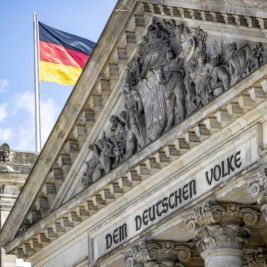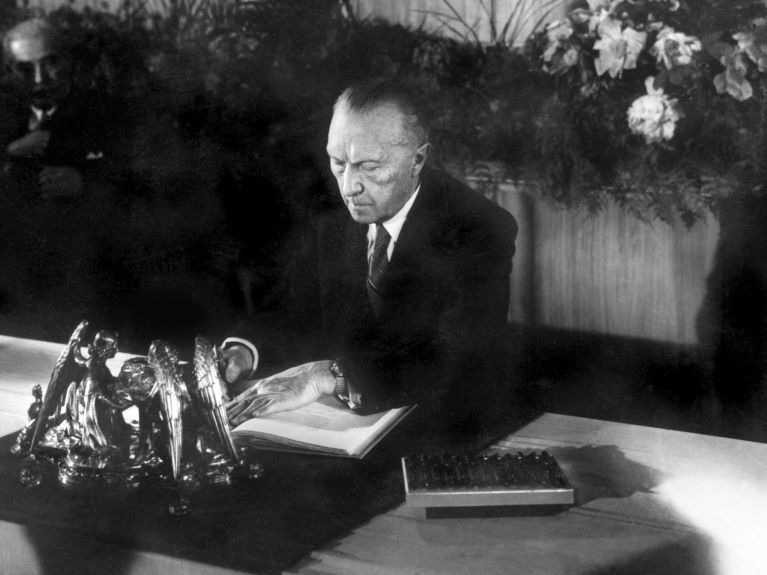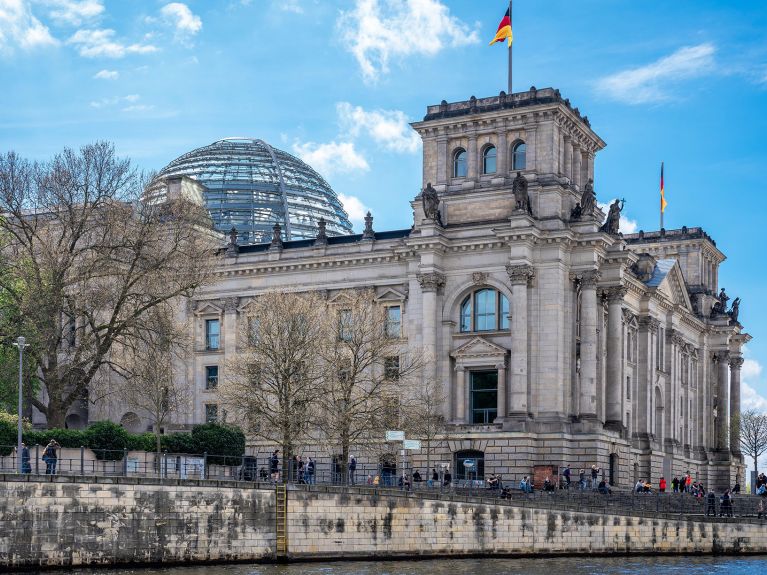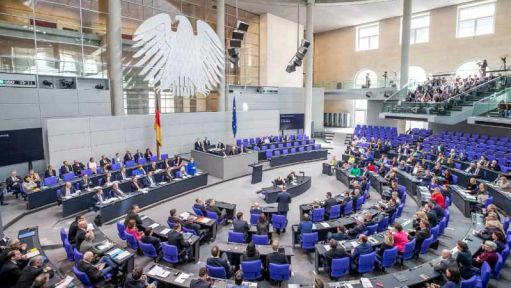
Germany celebrates 75 years of the Basic Law
The Federal Republic of Germany was founded with the signing of the Basic Law on 23 May 1949. The German constitution is regarded as a model for many countries.

The slim book weighs just 1,396 grams: the document it contains was ceremonially signed in Bonn on 23 May 1949. But its content carries enormous weight: the Basic Law signed at the Pedagogical Academy provides the legal basis for the Federal Republic of Germany, founded four years after the end of the Second World War. “Today, after the signing and adoption of the Basic Law, the Federal Republic of Germany enters history,” said the President of the Parliamentary Council, the later first Federal Chancellor Konrad Adenauer.
Parliamentary Council draws up Basic Law
The Council met for the first time in Bonn on 1 September 1948. It was made up of 61 men and four women representing different political groupings. They all shared the goal of establishing the basis for a German democracy after the Nazi dictatorship. It was deliberately intended that they were to draw up a basic law – not a constitution. In view of the division of Germany, the aim was to emphasise that the founding of the West German Federal Republic was provisional in nature. Almost five months after the Basic Law was adopted, the German Democratic Republic (GDR) was founded in October 1949 in the eastern part of Germany, a result of the post-war division of the country. The division of Germany did not come to an end until the fall of the Wall in 1989 and reunification in 1990.

“The Parliamentary Council learnt the lessons from the darkest chapter in German history,” said Bundestag President Bärbel Bas in September 2023 at a ceremony to mark the Council’s 75th anniversary. “Today we can look back with gratitude and pride; the provisional Basic Law has become a success story.”
“Human dignity shall be inviolable.”
The Basic Law adopted in 1949 begins with Article One, which remains valid and definitive to this day: “Human dignity shall be inviolable. To respect and protect it shall be the duty of all state authority.” Further fundamental rights follow up to Article 19, guaranteeing freedom of opinion and press, freedom of belief and equal rights. Article 20 lays down the principles for the structure of the state, starting with the words: “The Federal Republic of Germany is a democratic and social federal state.”
The 146 articles of the Basic Law also contain general provisions on the federal and state governments, provisions on the individual constitutional bodies such as the Federal Government and the Bundestag, on legislation, on the administration of the state, on jurisdiction and on finance.

Amendments to the Basic Law since 1949
According to Article 79, the Basic Law may only be amended by a two-thirds majority of the members of the Bundestag and the votes of the Bundesrat representing the states. No changes may be made to fundamental principles such as the protection of human dignity. Although there have been numerous amendments to the constitution since May 1949, the underlying features and character of the Basic Law have remained unchanged.
“Our constitution is something we can be proud of,” said Federal President Frank-Walter Steinmeier, looking ahead to the 75th anniversary of the Basic Law in 2024. “It protects and honours every single person.” It also provided the stable framework within which policymaking can develop, said Steinmeier. “It is a foundation that has sustained our country well so far – even when things have been tough.” It was his firm belief, he said, that: “It will continue to do so in the future.”
The German constitution since reunification in 1990
Since reunification in 1990, the Basic Law has applied to the whole of Germany. In the Unification Treaty of 31 August 1990, the governments of the Federal Republic of Germany and the German Democratic Republic resolved that the Basic Law would be adopted by the East German states. Since then, the preamble has stated that the Germans have “achieved the unity and freedom of Germany in free self-determination”. “This Basic Law thus applies to the entire German people.” The accession of the GDR to the Federal Republic was the formal step towards German reunification, which has since been celebrated on 3 October as German Unity Day.
Basic Law as a model for constitutions in other countries
Today, the Basic Law is one of the oldest constitutions in the world that is still valid. Other countries have used it as a source of guidance in drawing up their own constitutions. Federal Chancellor Olaf Scholz also says that although the Basic Law provides the basis for a liberal and democratic constitutional state, this must be supported by the citizens, too: “Democracy thrives not just on the important articles set out in the constitution, but also as a result of the fact that we as citizens support it, that we protect and defend it – also against those who try to undermine it from within.”











We explain why every citizen has two votes. Facts about the electoral system.
Find out more

